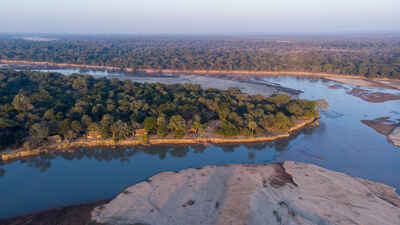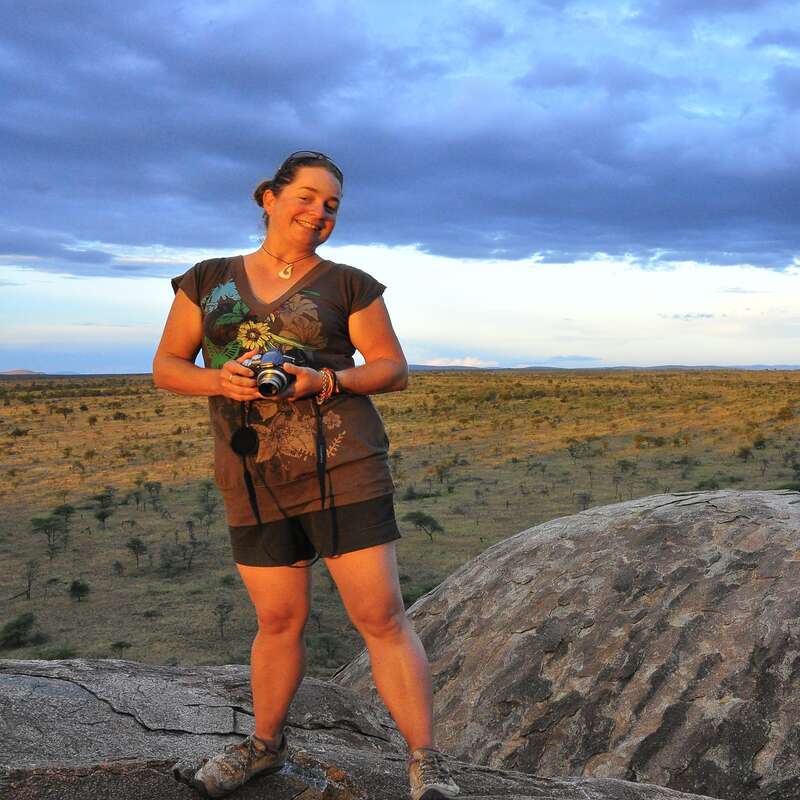About Takwela Camp
Few places offer a greater opportunity to escape from the outside world than the remote and intimate Takwela.
At the confluence of the Luangwa and Mwaleshi rivers, it feels at one with its wilderness setting.
Sit on the riverbank in front of your chalet and watch the hippos wallowing below – or listen from your comfortable bed to their grunts echoing across the water.
By all means roll down the canvas flap at the front of your chalet at night, but to keep it open is to feel more in tune with the environment. Open-air showers with reed walls accentuate that feel, while simple kikois can be used to temper the extremes of heat.
The natural world is key to the chitenge too: a U-shaped central area where mature trees help to support the high thatched roof. Settle down with a drink or a book, enjoy lunch in the shade, or take time spotting wildlife that’s drawn to the lagoon behind camp.
To explore the North Luangwa, where visitors are something of a rarity, is to marvel at the park’s remoteness. Whether viewed from the air on an incoming flight, or from an open-topped 4WD, or on foot, it instils a sense of wonder – a world interpreted by guides who are passionate about this near-untouched corner of Zambia.
Accommodation
4 chalets
Children
Best for 16+
Open
15 June to 31 October
Activities

4WD Safari

Birdwatching

Guided walking safari

Night drive
Traveller reviews of Takwela Camp
23 real, un-edited reviews from Expert Africa's travellers.
Arrived 19 Sep 2024, 2 nights
"Takwela Camp review"
Overall rating: Excellent
Arrived 6 Oct 2024, 3 nights
"Takwela Camp review"
Overall rating: Good
Arrived 29 Aug 2024, 3 nights
"Takwela Camp review"
Overall rating: Excellent
Arrived 27 Jul 2024, 2 nights
"Takwela Camp review"
Overall rating: Excellent
Arrived 20 Jul 2024, 3 nights
"Takwela Camp experience "
Overall rating: Excellent
Arrived 9 Jul 2024, 3 nights
"Takwela Camp review"
Overall rating: Good
Arrived 18 Oct 2023, 3 nights
"Takwela Camp review"
Overall rating: Excellent
Arrived 4 Oct 2023, 2 nights
"Takwela Camp review"
Overall rating: Excellent
Arrived 6 Sep 2023, 2 nights
"Takwela Camp "
Overall rating: Good
Arrived 4 Sep 2023, 4 nights
"Takwela Camp review"
Overall rating: Excellent
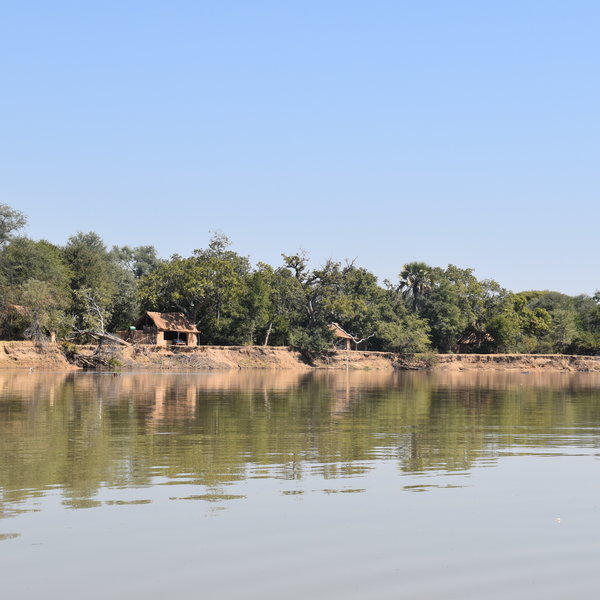
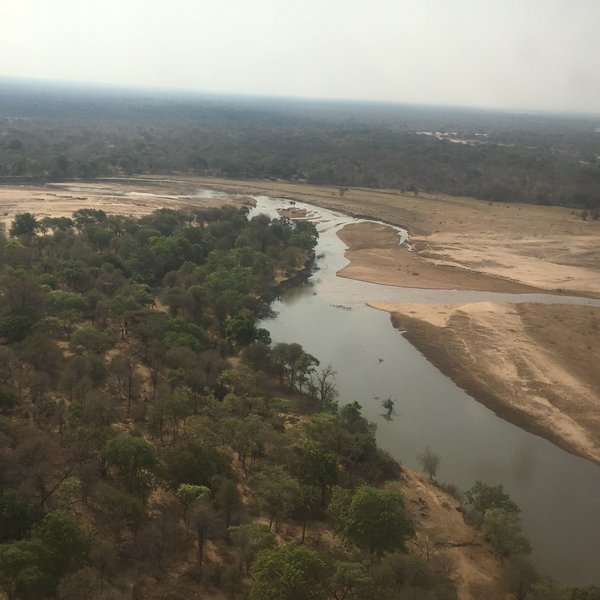
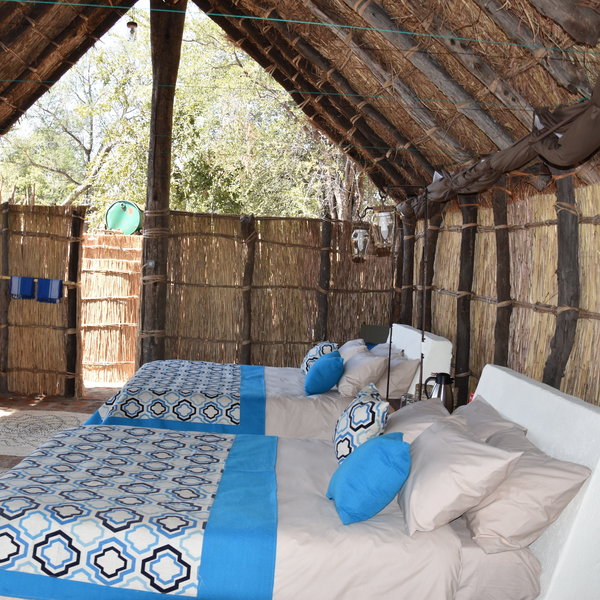
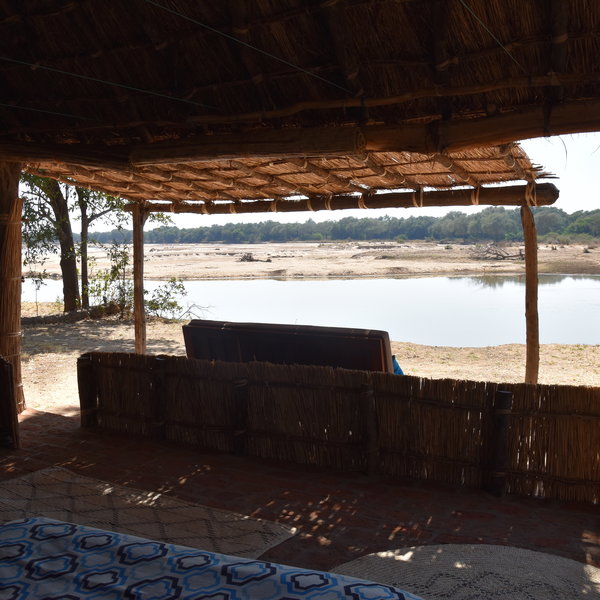
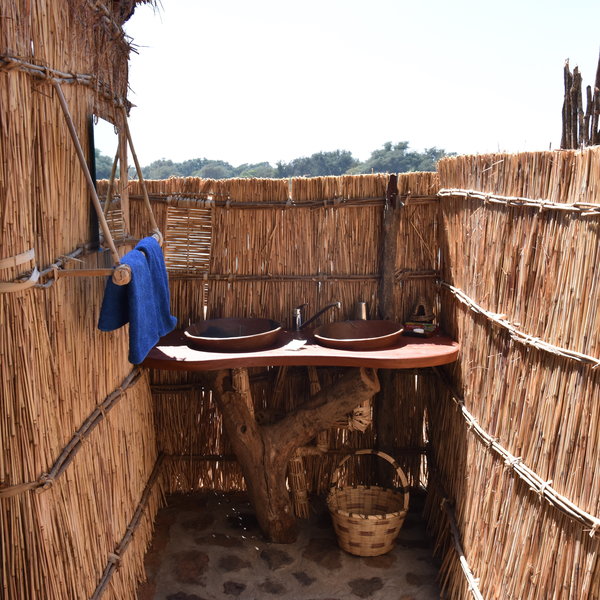
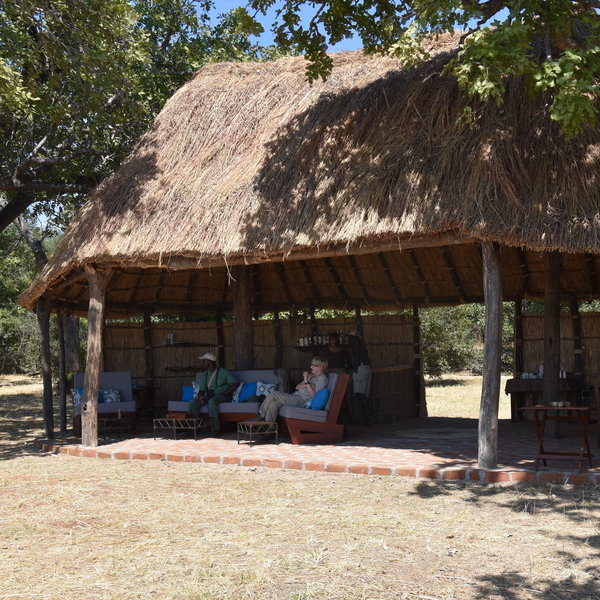
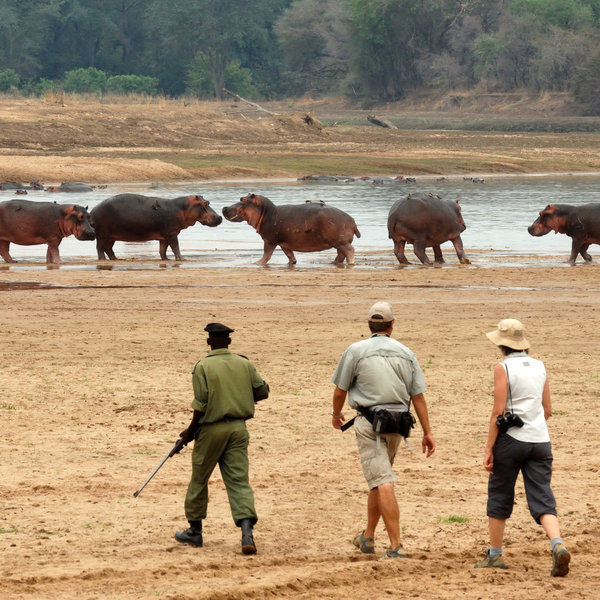
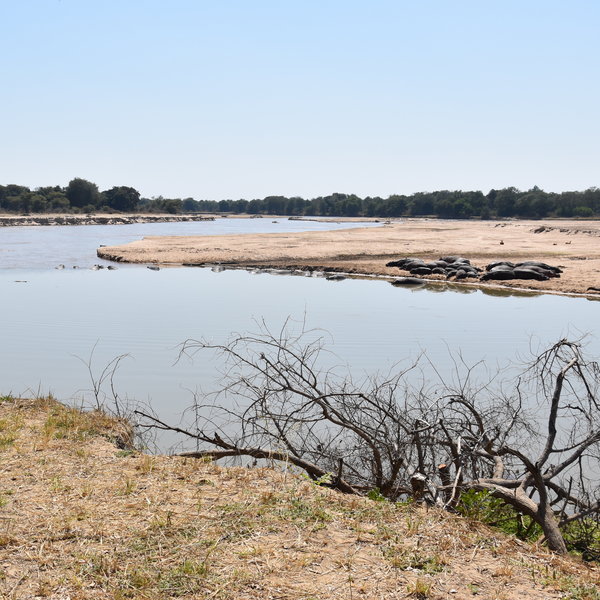
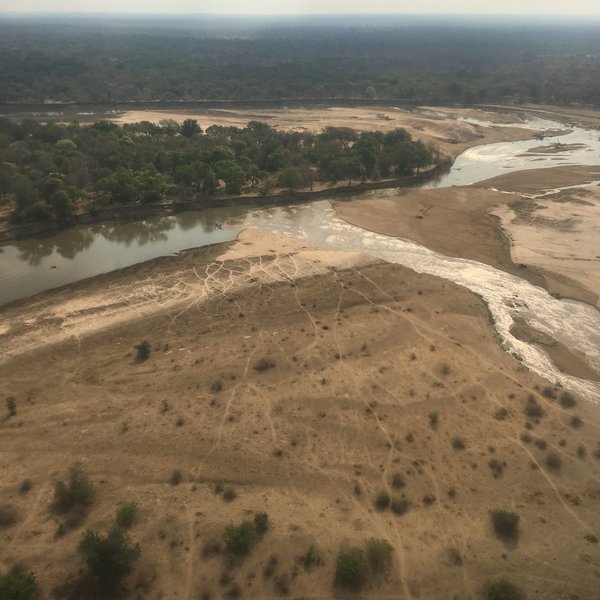
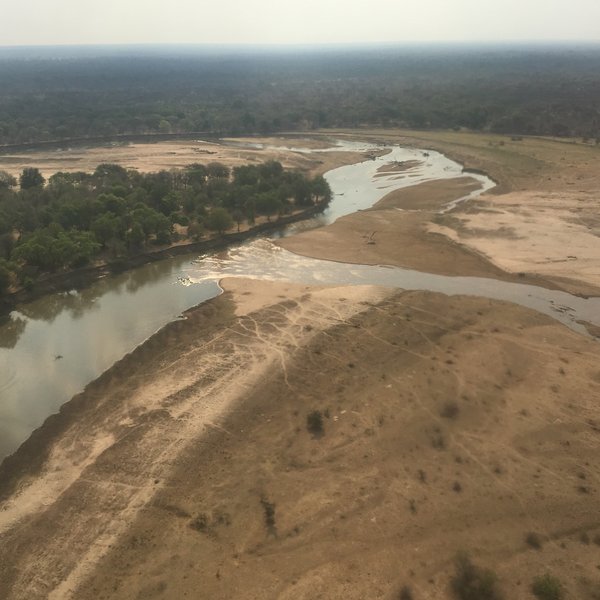
Expert Africa's gallery
When we travel we take lots of photos ourselves to give you a real and un-edited view of the safaris. See our 50 pictures of Takwela Camp to get the candid view.
View gallerySafaris visiting Takwela Camp
Just ideas, we'll always tailor-make a trip for you
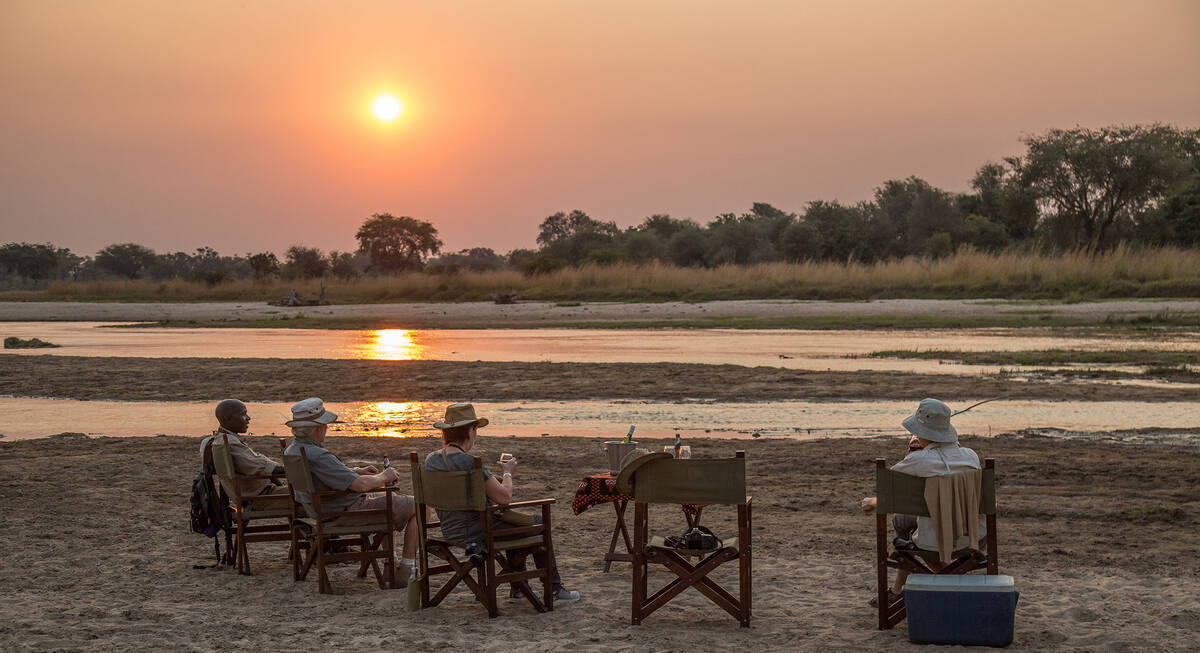
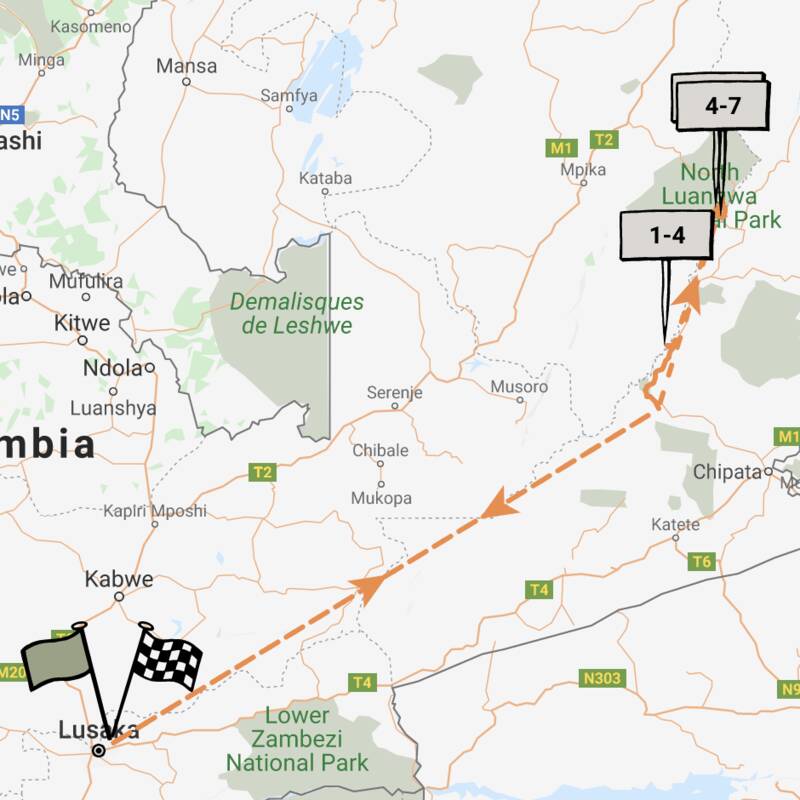
Giraffe Safari
9 days • 3 locations • 1 country
LUSAKA AIRPORT TO LUSAKA AIRPORT
A safari to the remotest parts of Zambia’s Luangwa Valley. Perfect for experienced safari goers and first-time Africa adventurers. Explore with expert guides whilst staying at small bushcamps.
Visiting South Luangwa, North Luangwa
US$8,700 - US$10,430 per person
Takwela Camp: Our full report
Offering game drives as well as walking safaris in Zambia's North Luangwa, Takwela Camp opened in July 2019.
Before this, most of the camps in the park focused largely on walking. While this has always ensured a top-class walking-only experience, it meant that options for people interested in a more varied safari experience were limited.
Takwela is both very simple and rustic, but with a good level of comfort and plenty of character, and constructed in a very similar style to its sister camp in the North Luangwa, Mwaleshi. We last visited the area in October 2022, and we loved the location, on the banks of the confluence of the Luangwa and Mwaleshi rivers.
Built in 2019, the camp initially had just two chalets, but two more were added in 2020. With a total of just eight beds, it remains an intimate and personal camp, one of the smallest in Zambia. It is managed by the head guide, Alex, a long-standing member of the Remote Africa team.
Takwela’s four chalets are open-fronted and spacious, allowing for a cooling breeze, with polished stone floors that are cool underfoot, and canvas fronts that can be rolled down for the night. Each chalet has a small veranda with a built-in cushioned couch, and sunloungers positioned for optimum views over the river.
Three of the chalets have two double beds whilst the fourth has a king-size bed. Large mosquito nets are draped around the beds, with small floor mats lie each side, and bedside tables set with solar-powered bedside lights and a small fan, along with a whistle and a flask of drinking water. To one side is a dressing area, with wooden shelves and space to hang clothes, plus additional shelving by the bathroom.
The en-suite bathrooms are largely open air, enclosed by reed walls, with a flushing toilet and twin sinks. An open-air shower has hot and cold running water, with a view out behind the camp. Shampoo, conditioner, body wash and insect repellent are all provided, as are kikois. These are particularly useful in the warmer months, when they can be wettened and laid over you during siesta time – a simple but very effective way to stay cool.
Throughout the chalets a colour scheme of turquoise and light blue boldly complements natural tones to give a smart yet cooling feeling. The same colours, enhanced by more polished floors, feature in the camp’s main area or chitenge, a U-shaped structure with high thatched ceilings supported by a combination of tall poles and natural trees. Along with a bar, a couple of seating areas and a charging station, you’ll find a small library, with lunch usually served here in the shade.
Behind the camp, a small lagoon attracts a variety of wildlife. On our last visit, we saw bushbuck, puku, kudu, warthog and elephants, the majority of which then wandered through camp browsing after they had finished drinking.
On the activity front, guests at Takwela can take part in both walking safaris and day and night game drives, with a very high standard of guiding. The camp is set in an area of the park with a varied environment: riverside plains blend with acacia, sausage tree and mahogany woodland, along with tracts of mopane woodland. As the camp becomes more established, so the wildlife is slowly becoming settled. Although elephants and leopard are less habituated due to the very small human footprint and extremely low numbers of visitors to the area, there are great sightings to be had. During our stay, lion, leopard, wild dog, plenty of plains game and even bushpig and aardvark were seen. The area around the camp is great for birders too, with numerous species to spot.
The North Luangwa National Park is also home to Zambia’s only population of black rhino. A huge level of conservation work to protect this threatened species has been conducted by the Frankfurt Zoological Society (FZS), together with the North Luangwa Conservation Programme (NLCP). While guests are very unlikely to see the rhino, it’s worth knowing that Remote Africa Safaris donates a percentage of each guests’ nightly rate to the NLCP. So just by staying at Takwela, you’re contributing to this invaluable work.
For a more varied safari, consider combining a stay with Takwela's sister camps, Mwaleshi, in the North Park and Tafika, Chikoko and Big Lagoon Camp in the South Luangwa National Park, whose standard of guiding is equally high.
It is possible to combine a stay between Takwela and Mwaleshi, covering the distance between the two on foot while your luggage is transferred by vehicle. With a mid-way stop for refreshments, the walk takes about four to five hours.
Alternatively, a safari combining both the North and South Luangwa allows you to experience both national parks; the 15-minute flight between the two parks makes for quick and easy transfers.
Activities
4WD Safari
Birdwatching
Guided walking safari
Night drive
Families & children
- Attitude towards children
- Minimum age 12 years
- Property’s age restrictions
- Children under 12 are not allowed to take part in walking safaris.
- Special activities & services
- None
- Equipment
- None
- Generally recommended for children
- We endorse Takwela's restriction to children above the age of 12, and recommend it only for mature children who have had previous walking experience in Africa.
- Notes
- Takwela is open to the bush and the river, with wild animals in and around camp, so parents or guardians need to be constantly aware of their children's whereabouts. They should note, too, that there were a few tsetse flies about when we last visited, as children tend to react more seriously than adults to the bites.
Food & drink
- Usual board basis
- Full Board & Activities
- Food quality
- Meals at Takwela are served either in the main chitenje or on the banks of the river. The food on our last visit, in October 2022, was delicious and very well presented, which is what we’ve come to expect from the Remote Africa camps. With sufficient notice, the camp can cater to a range of dietary requests.
Your day at Takwela will usually start with a light breakfast around the campfire before your morning walk .
This is followed by lunch at about 12.00pm, on your return to camp.
We were served a buffet with white and brown freshly baked loaves, chicken sosaties, chickpea and aubergine tagine, pizza, fresh salad from the Tafika gardens, pasta salad, carrot salad and a selection of pickles, dressings and sauces. Dessert was a light and creamy custard tart.
After a relaxing siesta, afternoon tea with freshly baked cake is offered around 3–3.30pm, depending on the time of year and the daily temperatures. You then head out for the afternoon activity and sundowners, before making your way back to camp for a full three-course dinner, served at around 7.30pm. - Dining style
- Group Meals
- Dining locations
- Indoor and Outdoor Dining
- Drinks included
- Flasks of filtered water are provided in the chalets and personal, refillable water bottles are provided for drinking water throughout the day. Soft drinks, house wine and some local spirits are included in the cost of your stay.
Our travellers’ wildlife sightings from Takwela Camp
Since mid-2018, many of our travellers who stayed at Takwela Camp have kindly recorded their wildlife sightings and shared them with us. The results are below. Click an animal to see more, and here to see more on our methodology.

100% success

100% success

82% success

73% success

71% success

56% success

50% success

31% success

7% success

0% success

0% success

0% success

0% success

0% success

0% success
Getting there
- Location
- North Luangwa National Park, Zambia
- Ideal length of stay
- We'd recommend a stay of at least 3 or 4 nights in the North Luangwa - whether that's just at Takwela, or a stay combining its sister camp Mwaleshi also.
- Directions
- Guests fly to Mwaleshi, the airstrip that serves the North Luangwa National Park, either from Mfuwe or Lukuzi, the airstrip next to Tafika, and from Mwaleshi will be transferred by vehicle to Takwela. This is approximately a 45-minute drive from the airstrip, and may include a river crossing.
- Accessible by
- Fly-and-Transfer
Sustainability
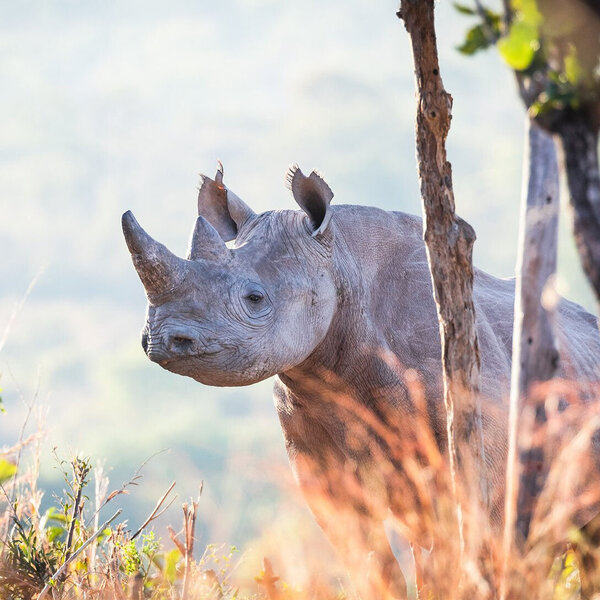
Saving rhino populations in the North Luangwa
Home to Zambia’s only black rhino population, the North Luangwa National Park is overseen by the North Luangwa Conservation Programme (NLCP), which is part of the Frankfurt Zoological Society (FZS). The programme, set up in 1986 to help stop heavy poaching in the park, has made huge inroads into the conservation efforts here, with poaching reduced and wildlife populations increasing.
Black rhinos were introduced into the park in 2003 and Remote Africa Safaris have been constant supporters of the NLCP, donating a portion of profits to the programme yearly.
The NLCP also works alongside the Zambian government to protect valuable water resources in the area. The North Luangwa National Park incorporates the source of four of the six perennial tributaries of the Luangwa River, a water source for thousands of people along its banks.
In addition, the programme promotes diversification by working with local farmers to instill best practice in conservation, supporting community horticulture, and training beekeepers.
Photo credit: Mana Meadows / FZS.
See more great sustainability projects in Zambia
Communications
- Power supply notes
- Takwela runs on solar power. In the event of no sun for a protracted period of time, there is a back-up generator to charge the batteries.
- Communications
- There is no cellphone reception although the camp is in constant radio contact with its main camp, Tafika.
- TV & radio
- None
- Water supply
- Borehole
- Water supply notes
- The bathrooms at Takwela have plumbed taps and basins, hot and cold showers, and flush toilets.
Health & safety
- Malarial protection recommended
- Yes
- Medical care
- Staff are trained in first aid, and first-aid kits are located in the office and in all vehicles. The closest doctor is in Mfuwe – a 50-minute flight from Mwaleshi Airstrip (a 45-minute drive from Takwela), then a road transfer of approximately 25 minutes.
- Dangerous animals
- High Risk
- Security measures
- Both your guide and the camp staff stay in camp with you, and guests are escorted to their chalets in the hours of darkness.
- Fire safety
- There are fire extinguishers in all common areas and sand buckets outside each chalet.
Useful info
- Disabled access
- On Request
- Money
- There is a secure box in the staff quarters if you wish to leave valuables there. No exchange facilities are provided.
- Accepted payment on location
- No money is accepted at Takwela. Any necessary payments may be made at Tafika, which accepts cash in UK pounds, US dollars, euros and Zambian kwacha. Visa and Mastercard are also accepted at Tafika, with a small surcharge.
Plan and book your trip with Expert Africa
All of our trips are tailor-made, so we'll always adapt them to suit you. Talk to an Expert and let us plan and arrange your perfect trip.

Talk to an Expert
Call or email us now! We’ll match you with the Specialist in our team who is best suited to help you. Then together we can start planning your trip.

Set up your itinerary
Based on our experience and your ideas, your specialist will create a detailed, costed itinerary. We’ll refine it together, until we have a trip that you’re perfectly happy with.

Prepare for your trip
The same Specialist will make the seamless arrangements for your trip, send you detailed travel documents, and be available to answer any questions before you depart.

Travel with peace of mind
After you set off, you’ll be cared for by our partners in Africa, most of whom have worked with Expert Africa for decades. And if you ever need us urgently, we’re available 24/7.

When you return
We love to learn about your trip, and so will always be grateful if you’ve the time to give feedback to your Specialist when you return.
Takwela Camp's location
Look closer at the environment and surroundings of Takwela Camp.
Other lodges in North Luangwa National Park
Alternative places to stay in this same area.
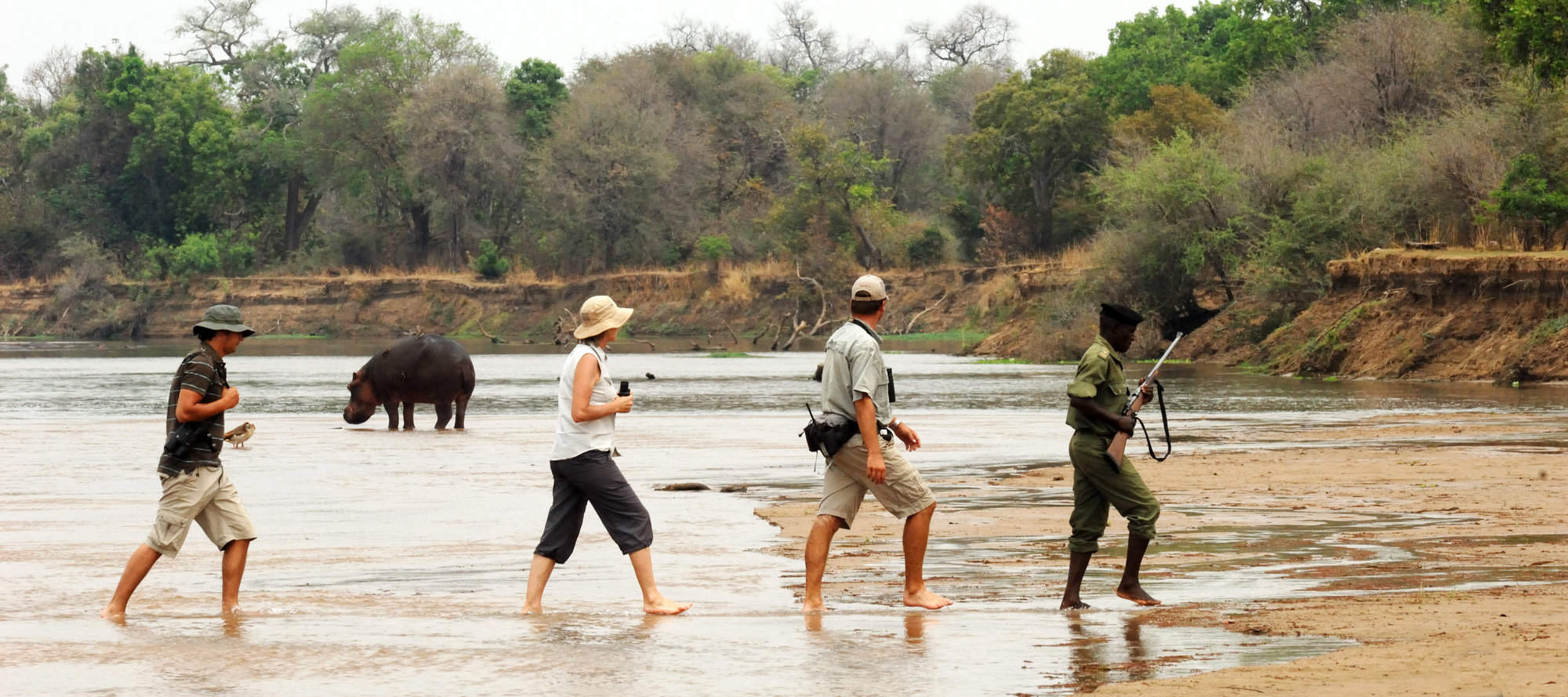
Mwaleshi Camp
Mwaleshi is a particularly remote and rustic bushcamp in North Luangwa National Park that concentrates purely on walking safaris. It's very small, but run by a top-quality operation – so come here for walking safaris run by super guides and an excellent wildlife experience.
When to go to North Luangwa National Park
Our month by month guide: What it's like to visit Takwela Camp in North Luangwa National Park
Jan
Feb
Mar
Apr
May
Jun
Jul
Aug
Sep
Oct
Nov
Dec
North Luangwa National Park in January
In North Luangwa, January marks the peak of the wet season. Expect daily downpours, often lasting several hours, punctuated by brief sunny intervals. Temperatures soar above 30°C/86°F, accompanied by high humidity.
The landscape is a lush, green paradise, but this abundance of vegetation and water allows the larger game to spread out, making it much harder to spot. Birdlife thrives during this period, with numerous migratory species present – and many species sporting beautiful breeding plumage.
Many roads in the national park are impassable, limiting access. Safari camps in North Luangwa are closed and visitors are very scarce.
- Wet season peak, warm and moist climate
- Verdant scenery, ideal for nature photography
- Wildlife scattered, challenging to spot
- Vegetation high; no walking safaris
- Safari camps are closed
Our view
This is not a great time to visit
Weather in January
North Luangwa National Park in February
February in North Luangwa National Park is at the heart of the rains. Dramatic thunderstorms are a daily occurrence, often followed by clear skies.
The park remains verdant and waterlogged, making both getting around and game viewing challenging. However, patient observers with the logistics to get here may be rewarded with sightings of animals with their young.
The Mwaleshi River, swollen by the rains, can’t be easily crossed – adding to the very wild and remote feel of the park. Navigating by canoe would probably be easier than by safari vehicle!
The lush scenery and dramatic skies create excellent photographic opportunities for landscape enthusiasts who can get here.
- Rainy season continues, warm and humid weather
- Lush landscapes, but large animals hard to see
- Many birds resplendent in breeding plumage
- River levels high, altering park dynamics
- Scarce visitors, safari camps closed
Our view
This is not a great time to visit
Weather in February
North Luangwa National Park in March
March sees the gradual tapering of North Luangwa's rainy season. While heavy showers persist, they become less frequent. The park is at its most verdant, with water bodies at their fullest. Temperatures remain high, often exceeding 30°C/86°F, with considerable humidity.
Wildlife viewing remains challenging due to the thick vegetation, but predator activity increases as they take advantage of vulnerable young prey. Some palearctic migrant bird species start to migrate back north. As the skies begin to clear more frequently, the combination of dramatic clouds and lush landscapes provides stunning photographic possibilities.
- Final month of wet season, balmy and damp
- Abundant greenery with plenty of smaller animals
- Antelope species have young around
- Access to ( and safaris in) the park are challenging
- Safari camps remain closed
Our view
This is not a great time to visit
Weather in March
North Luangwa National Park in April
April marks a transition in North Luangwa as the heavy rains give way to occasional light showers. The landscape remains lush and green, but wildlife starts to become more visible as vegetation begins to thin. Safari camps remain closed. The levels of the Mwaleshi River begin to recede, exposing sandbanks that attract the odd basking crocodile.
This month offers a blend of green scenery and improving wildlife sightings. The air is clear, providing excellent visibility for photography. As visitor numbers are still low, those who visit can enjoy a sense of exclusivity in the park.
- Rainfall tapering off, warm and occasionally wet
- Verdant surroundings, wildlife viewing improving
- Rivers full, altering animal movement patterns
- More roads becoming accessible
- Very low numbers of safari visitors
Our view
This is not a great time to visit
Weather in April
North Luangwa National Park in May
May heralds the beginning of the dry season in North Luangwa. Rain becomes a rarity; most days are clear and sunny. Temperatures and humidity continue to reduce, with daytime highs around 25°C/77°F. The landscape begins its transformation from lush green to golden hues.
Wildlife viewing improves significantly as vegetation thins and the animals start appearing around permanent water sources. Most safari camps start to make ready or even reopen around the end of May, offering the first walking safaris of the season. The clear air and thinning vegetation provide excellent conditions for photography. May offers a good balance of comfortable weather, improved game viewing, and relatively low visitor numbers.
- Dry season onset, mostly clear and mild days
- Landscape still green, excellent for photographers
- Wildlife sightings becoming more frequent
- Vegetation thinning and drying
- Safari camps make ready, some reopen
Our view
A good time to visit, with pros & cons
Weather in May
North Luangwa National Park in June
June in North Luangwa National Park is characterised by cool, dry conditions. Daytime temperatures hover around 23°C/74°F, but nights can be chilly, dropping to around 10°C/50°F. The absence of rain and decreasing humidity make for comfortable safari conditions and lovely walking.
The thinning vegetation significantly improves visibility for game viewing. Camps in the park are open and operational during June. The Mwaleshi River becomes a focal point for wildlife safaris, offering excellent wildlife viewing. The clear skies and golden light make for stunning sunrise and sunset photography.
- Consistently sunny days, cooler nights
- Ideal conditions for guided walking safaris
- Animal viewing opportunities increasing
- Safari camps open and accessible
- Almost all roads now accessible
Our view
A very good time to visit
Weather in June
North Luangwa National Park in July
July brings winter to North Luangwa, with cold nights and mild days. Temperatures can drop to single digits at night but warm up to the low 20s°C/70s°F during the day.
The landscape is now predominantly golden, with much vegetation becoming drier. Wildlife is seen more often around the remaining water, particularly the Mwaleshi River, leading to excellent game viewing opportunities there.
Walking safaris in the national park are at their prime, with cool temperatures and good visibility. All camps are open and North Luangwa is as busy as it gets – although it remains a remote park with very few visitors. Early mornings can be particularly cold, so warm clothing is essential for game drives; it’s perfect weather for walking safaris.
- Pleasant days, chilly evenings
- Clear skies with very few clouds and no rain
- Vegetation thinning, enhancing visibility
- Wildlife sightings significantly improved
- Prime time for on-foot safari experiences
Our view
A very good time to visit
Weather in July
North Luangwa National Park in August
August in North Luangwa National Park is one of the best months for a walking safari as the days are clear and cloud-free, with wonderfully cool mornings as you start out. The dry conditions increasingly force wildlife to visit permanent water sources, making sightings more predictable. Daytime temperatures are pleasant, in the mid-20s°C/70s°F, even though nights and early mornings remain cold and fresh.
The vegetation has become more sparse, providing excellent visibility for wildlife spotting. There are a few less insects and smaller creatures around than earlier in the year. The dry conditions sometimes lead to a haze on the horizon, which can affect long-distance views and photography.
- Dry conditions, warm days and cool nights
- Optimal weather for walking safaris
- Excellent wildlife viewing near water sources
- Vegetation thinning out so easier to view wildlife
- Some haze may affect long-distance views
Our view
Fantastic: the very best time to visit
Weather in August
North Luangwa National Park in September
September is usually considered ‘the’ best month for visiting North Luangwa National park on safari. Daytime temperatures start to climb, reaching the low 30s°C/high 80s°F, while nights become more temperate. The landscape is dry, with excellent visibility for game viewing through drying vegetation.
Wildlife concentrates more around remaining water sources, leading to frequent and diverse sightings. It’s so shallow in parts that you can paddle across the Mwaleshi River – or cool your feet during a walk. Walking safaris are warming up, but still not too hot and offer thrilling close encounters with animals.
The tiny camps here are sometimes full, so planning ahead is essential. The conditions can create a heat of heat, dust and smoke which affects photography.
- Dry, warm days and mild nights
- Prime month for observing wildlife
- Great time for walking safaris
- Rivers and waterholes shrinking
- Landscape hazy from dust and bush fires
Our view
Fantastic: the very best time to visit
Weather in September
North Luangwa National Park in October
October marks the end of the dry season in the national park, bringing intense heat and anticipation of the rains. Daytime temperatures in North Luangwa climb and frequently exceed 35°C/95°F, with nights remaining very warm.
The landscape is parched, with most vegetation brown and lifeless. Wildlife viewing reaches its peak as animals desperately seek out the few remaining water sources. Predator-prey interactions are common, offering exciting but sometimes intense viewing experiences. Walking safaris are challenging due to the heat. Safari camps start to close towards the end of the month. The dry conditions can create a haze of heat and dust, affecting visibility and photography.
- Optimal chances to see the wildlife
- Very warm temperatures, day and night
- Environment feels harsh and arid with the heat
- Water sources scarce, concentrating animals
- Hazy atmosphere, challenging for photographers
Our view
A very good time to visit
Weather in October
North Luangwa National Park in November
November typically sees the return of rains to North Luangwa, though the timing is always unpredictable. Early in November, conditions remain hot and dry, but when rains arrive, the landscape begins a rapid transformation.
Temperatures remain high, often above 30°C/86°F, with increasing humidity. Initial rains bring rapid greening of the landscape and dispersal of wildlife. Game viewing becomes more challenging as animals are no longer confined to limited water sources.
Safari camps are closing as access becomes difficult: bush roads become impassable when heavy rains start. The rains clears the air of dust and haze, creating vibrant, clear air that is excellent for photography.
- Wet season beginning, hot and muggy
- Increasing likelihood of rainfall
- Wildlife dispersing as vegetation busts into life
- Insects and smaller creatures emerge
- Birds starting to don breeding plumage
Our view
A good time to visit, with pros & cons
Weather in November
North Luangwa National Park in December
December is firmly in the grip of the wet season in North Luangwa National Park. Regular thunderstorms occur, often in the afternoons, followed by periods of sunshine. The landscape becomes increasingly verdant. Temperatures remain high, often exceeding 30°C/86°F, with high humidity.
Wildlife viewing is challenging as animals disperse across the now water-rich environment. However, this is an excellent time for birdwatching, with many migratory species present. Safari camps in the park are closed and very few visitors are here to witness the park's dramatic seasonal transformation.
The combination of stormy skies and green landscapes offers unique photographic opportunities.
- Rainy season underway, warm and wet days
- Wildlife harder to spot in thick vegetation
- Lush scenery, improved photographic conditions
- Safari camps now closed for the season
- Very few visitors as most roads inaccessible
Our view
This is not a great time to visit
Weather in December

Looking for inspiration on where to travel next?
Visit our trip chooser to explore your options and find inspiration for your perfect African adventure
Inspire me